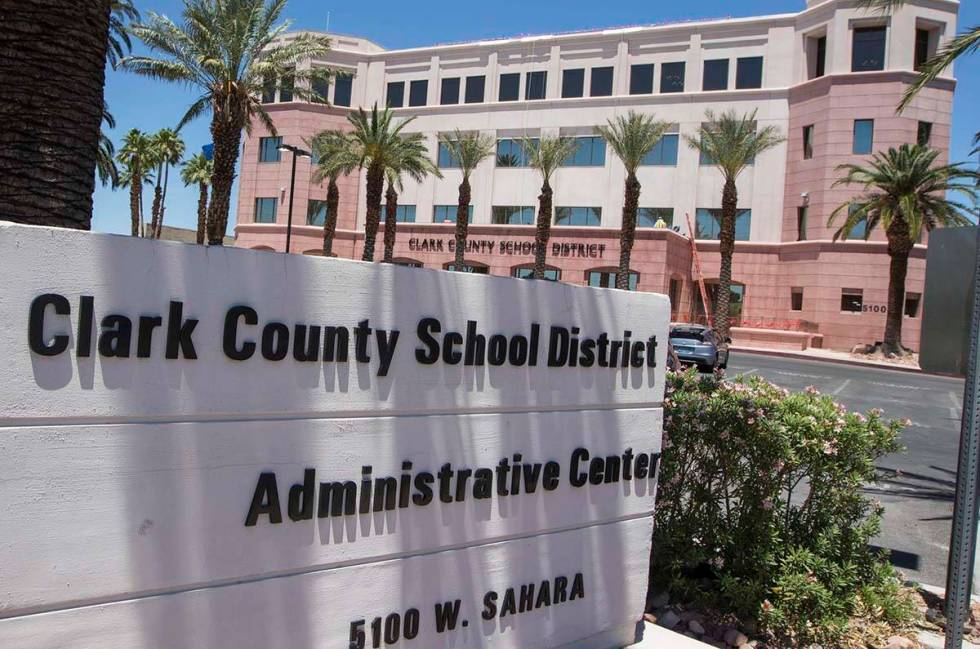CCSD could see $32.6M drop in general education revenue

The Clark County School District could receive $32.6 million less in state general education funding due to lower student enrollment numbers than projected.
The school board voted unanimously earlier this month to approve the district’s 2022-23 amended final budget, totaling $2.8 billion for the fiscal year that began July 1.
The district is required to submit an amended final budget to the state by the end of this year.
Chief Financial Officer Jason Goudie told the Las Vegas Review-Journal that the purpose of a budget is that “it’s a forecast.”
The $32.6 million isn’t a revenue loss, he said, noting “you can’t lose something you never had.”
When there’s a lower enrollment projection and “revenue result,” the district would technically need fewer teachers and support professionals, Goudie said.
The district will reduce expenses to compensate for those components in the budget, he said, and realign expenditures without any cuts to schools or departments.
The district — the nation’s fifth-largest with more than 300,000 students — is financially disciplined and structured, which has allowed it to absorb these “minor changes,” Goudie said.
The district involuntarily transfers some employees to different sites each fall — a process known as “surplus” — based on student numbers. But a worker shortage meant there were many jobs to choose from.
As of Monday, the district had 1,080 licensed job positions — a category that includes professionals such as teachers, counselors and school nurses — and 585 support staff jobs posted on its hiring website.
Enrollment lower than projected
Average daily enrollment, which is used for state funding, was approximately 4,058 students lower than originally anticipated.
The district compiled initial projections around November and December 2021, according to a statement in response to a Las Vegas Review-Journal inquiry. That’s due to a requirement to provide budgets to schools by Jan. 15 for the following fiscal year.
The district estimated average daily enrollment would be 300,029, but now it’s expected to be 295,970.
The district had projected enrollment would be “somewhat flat,” Goudie told school board trustees earlier this month, but the drop will impact revenues.
Enrollment numbers for the budget are a different calculation than total student numbers reported this fall to the Nevada Department of Education for “validation day.”
The district had 304,276 students as of an Oct. 3 official enrollment tally — 506 fewer than on Oct. 1 last year.
The district also uses an internal fall “count day” to determine how much money is allocated to schools, which have autonomy over their budgets under the state’s reorganization law.
It’s the fifth consecutive year the school district has seen an enrollment drop.
District officials have cited factors such as new public charter schools opening in the valley, an earlier kindergarten cutoff date and more broadly, a drop in birth rates during the Great Recession.
Some families also opted to leave the district in favor of other options such as homeschooling and private schools during the COVID-19 pandemic, when the district operated with distance learning for about one year.
Protecting students from budget effects
Megan Griffard, an assistant professor in UNLV’s educational policy and leadership program, told the Review-Journal the school district is going to have to strategically reallocate resources to ensure students are protected as much as possible from the effects of the budget situation.
That especially includes students at Title I schools — those with a high poverty rate — as well as English language learners, those receiving special education services and students of color, she said.
As for enrollment, the population in Clark County is growing, so “it’s interesting that we’re not seeing the student population growing in the same way” within the school district, she said.
Some of that is due to expanded school choice, she said, noting homeschooling is an increasingly appealing option for a lot of families — especially, those with strong religious preferences.
She said she thinks the district will want to consider what can be done to bring students and families back into its schools.
Contact Julie Wootton-Greener at jgreener@reviewjournal.com or 702-387-2921. Follow @julieswootton on Twitter.